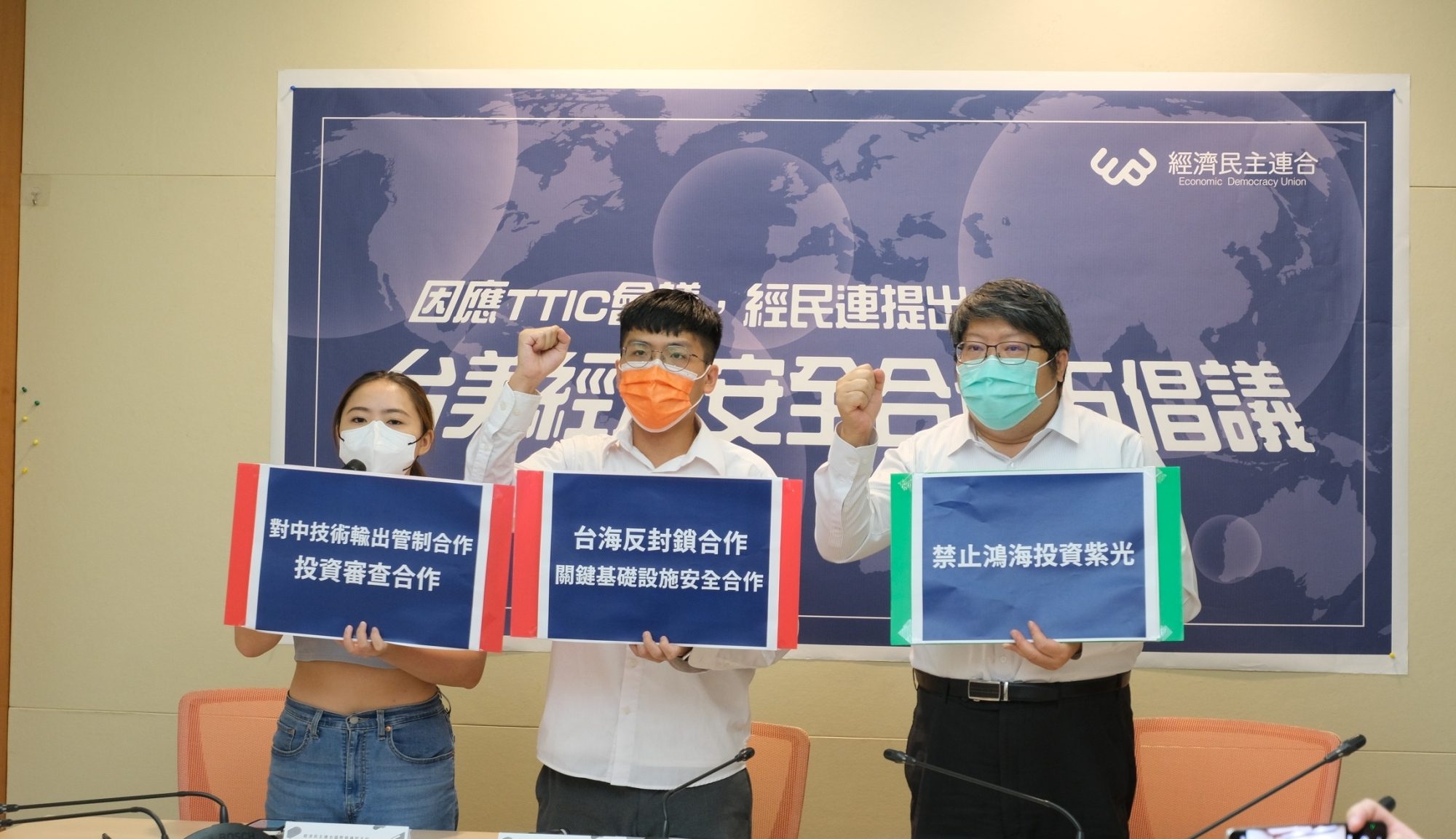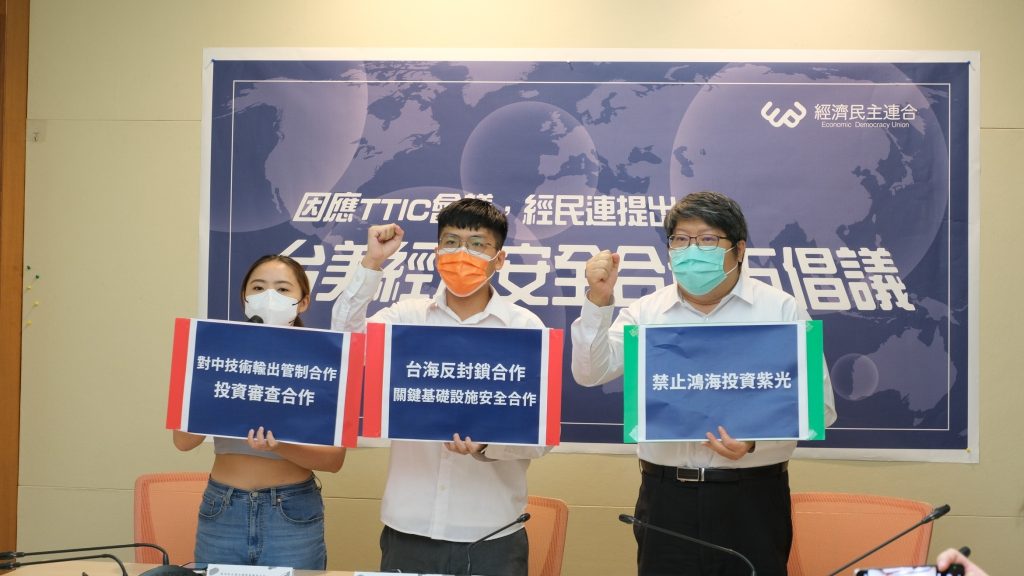
Per report, Taiwan and the United States will convene the Technology Trade and Investment Collaboration (TTIC) framework meeting in Washington from October 12th to 14th, and the implementation of the CHIPS and Science Act was listed as one of the subjects of the meeting. The Economic Democracy Union held a press conference this morning (29th) to broach the “Five Initiatives on Taiwan-US Economic Security Cooperation”, including Taiwan Strait anti-blockade cooperation, security cooperation on key infrastructure, cooperation in technological export control to China, cooperation in investment screening, and barring the investment to Tsinghua Unigroup by the Foxconn Group. The Economic Democracy Union called on the governments of Taiwan and the U.S. to include Taiwanese civil sector initiatives into the subject matter of bilateral cooperation and dialogue, and urged the government to organize the Investment Commission of the Ministry of Economic Affairs (MOEAIC) responsible for investment review and incorporate it into economic security mechanisms.
Hsu-Shao Ou: The four economic dialogue channels between Taiwan and the U.S. highlighted the importance of economic security
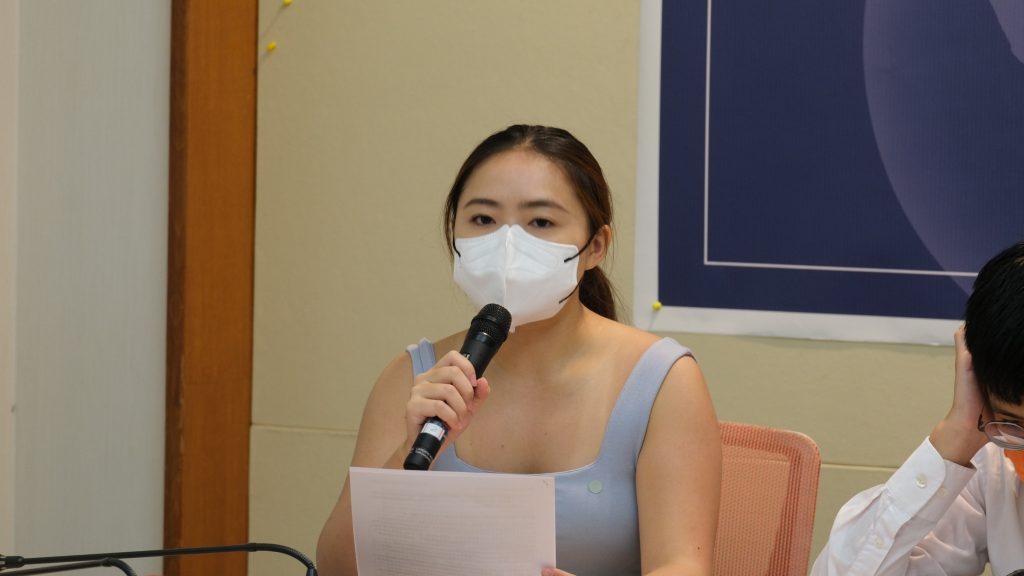
Hsu-Shao Ou, researcher of the Economic Democracy Union, pointed out that Taiwan-US economic cooperation has steadily deepened in recent years, and was equipped with four major channels for economic dialogue, including the longest-running Trade and Investment Framework Agreement (TIFA), the U.S.-Taiwan Economic Prosperity Partnership Dialogue (EPPD) which was established in 2020, U.S.-Taiwan Initiative on 21st-Century Trade which was announced in 2022, and the Technology, Trade and Investment Collaboration (TTIC).
To respond to supply chain changes of the technology industry, the Technology, Trade and Investment Collaboration (TTIC) was initiated in 2021, to tackle issues regarding semiconductors, 5G, electric vehicles and its components, among other fields; and to expand bilateral trade, promote investment, foster industrial collaborations, and achieve supply chain diversification. Recently, Sandra Oudkirk, the Director of the American Institute in Taiwan (AIT), stated in an interview that “The next interaction under the TTIC framework will be held in Washington from October 12 to 14.” and “At this event, we plan to hold roundtable discussions to share more views on how the CHIPS and Science Act can be implemented in the United States.”
Hsu-Shao Ou stated that the CHIPS and Science Act of the U.S. requires enterprises that have received US government subsidies to not expand investment in wafer manufacturing below 28 nanometers in China, Russia, Iran and other countries within 10 years, which indicated the intention of U.S. to compete in high-tech strategic positions with China. Similarly, the U.S.-Taiwan Economic Prosperity Partnership Dialogue (EPPD) of 2020 and 2021 had included issues of supply chain resilience, countering economic coercion, and investment review into its topics for discussion. The Economic Democracy Union suggests governments of the two nations to regard the economic security cooperation of Taiwan and U.S., as a central issue in economic dialogues, to substancialise a partnership that “deepens U.S.-Taiwan economic relations, further consolidate social respect for democratic institutions, and bring Taiwand U.S. together and create prosperity by the shared faith in free trade, innovation, and freedom.”
Guan-Ze Syu: Five Initiatives on Taiwan-US Economic Security Cooperation
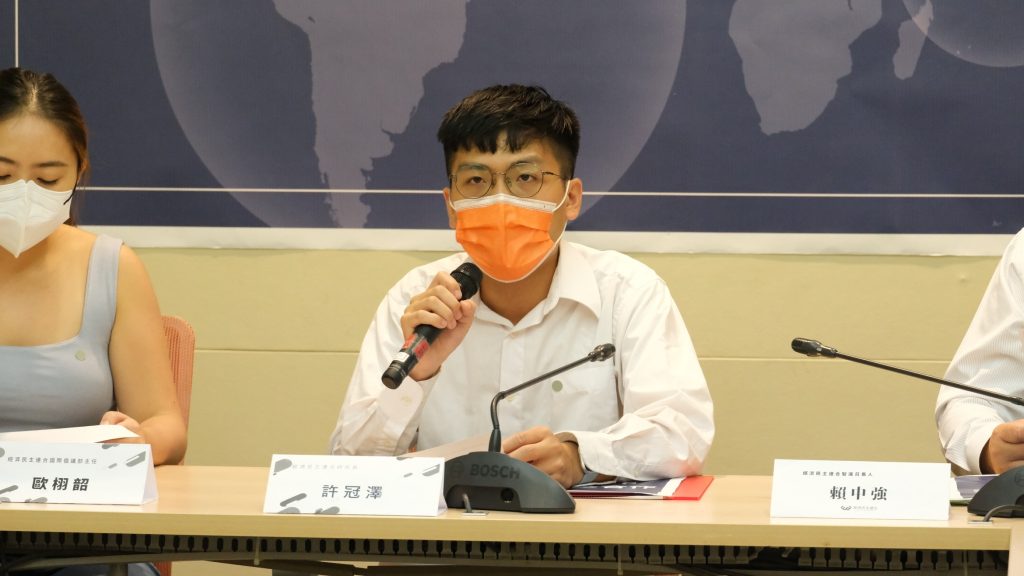
Guan-Ze Syu, researcher of the Economic Democracy Union, pointed out that considering the provisional norms of the CHIPS and Science Act and the conclusions of the U.S.-Taiwan Economic Prosperity Partnership Dialogue (EPPD), Economic Democracy Union had proposed five initiatives on economic security cooperation that shall be prioritized:
I. Taiwan Strait anti-blockade cooperation
The governments shall draft response plans, conduct war games and practical exercises, to ensure that in cases where the People’s Liberation Army imposed a sea and air blockade on Taiwan in the name of the exercise, the U.S. is capable in transporting chips produced by Taiwanese fabs out of the island; can assist Taiwan in stockpiling and continuously obtaining raw materials for semiconductor production, natural gas for power generation, and basic staple merchandises. Further, the governments shall also ensure Taiwanese high-tech talents can be withdrawn to backup factories when necessary.
II. Security cooperation on key infrastructure
According to a recent issue of CommonWealth Magazine, the industrial parks and science parks of Taiwan, which are responsible for the chip production needs of democratic countries, had largely purchased OEM surveillance systems produced by Hikvision. Not to mention that the Science Park Logistics is currently under the management of Robert Kuok, an entrepreneur of Chinese ethnic. Our concern is warranted that China may track every move of Taiwan’s industrial parks and science parks through Hikvision monitors, and paralyze the security facilities in the parks before carrying out sabotage operations. Without a Department of Homeland Security, the security of Taiwanese critical infrastructure is admittingly fragile. Through Taiwan-U.S. cooperation, the security facilities and specifications of the U.S. military may be fully introduced.
III. Cooperation in technological export control to China
Contrasted against China which was subjected to technological export prohibition of the U.S., Taiwan is nevertheless in the American circle of trust. However, should more evidence arise that indicates Taiwan is the weak link for China to obtain key American technology, this mutual trust will be damaged and thus affect Taiwan’s position in multinational supply chains. The suspected SMIC usurping of the seven-nanometer process from TSMC can be regarded as a somber omen. Taiwan shall meticulously establish Sensitive Technology Protection Act or other regulations regarding technological export; the clause for economic espionage in the National Security Act that was amended by the legislature in the last session, can only sanction “corporate traitors” who embezzled corporate information, but not business owners who illegally export key information to China. The government shall reference the CHIPS and Science Act which requires enterprises that have received US government subsidies to not expand investment in wafer manufacturing below 28 nanometers in China, Russia, Iran and other countries within 10 years, to include “wafer manufacture below 28 (or 16) nanometers” in the provisions of “Prohibited Items for Investment or Technological Cooperation in the Mainland Area”, and to bar licensed investors from expanding the scale of production. At present, the only prohibited item is the “wafers with 12-inch diameter or higher” which was deemed as obsolete and ceased to exist in the industry.
IV. Cooperation in investment screening.
On March 18th of this year, Premier Tseng-Chang Su made a clear statement on the investigation and apprehension of illicit Chinese capital in his response to inquiries of the Legislative Yuan: “Chinese capital is moving in and out freely. Taiwan cannot allow it to behave like this. We should close the tap, not just mop the floor.” The foreign investment regulation of Taiwan adopts a dual-track system: lenient attitude toward “foreign capital, Hong Kong capital and overseas Chinese capital” and strict against Chinese capital, resulting in undesirable loopholes; in 2008 and 2009, these loopholes (including single holding investment of less than 10% was exempt from review, and a third-location enterprise will be deemed as Chinese capital only when Chinese nationals gain control or holds more than 30% of the shares) were further abused by “The Four” (Chi-Ming Yin, Liang-Tung Fan, Tang-Chieh Wu, Lien-Sheng Tsai).
Taiwan shall refer to the U.S. Foreign Investment Risk Review Modernization Act of 2017 (FIRRMA) and comprehensively amend its legal framework, the U.S. shall also utilize its global influence to assist Taiwan in reviewing the source of funds of suspicious foreign investments.
V. Bar the investment to Tsinghua Unigroup by the Foxconn Group.
The decision to invest in Tsinghua Unigroup is basically Foxconn taking a stance against the U.S. against the backdrop of technology war and geopolitical confrontation between the U.S. and China. In contrast with China which was subjected to technological export control and sanctions, Taiwan was included in the U.S.-Taiwan Economic Prosperity Partnership Dialogue (EPPD) for two years, and was advocated to form the US-Taiwan-Japan-South Korea “Chip 4 alliance”. In actuality, the investment in Tsinghua Unigroup by Foxconn is how Xi Jinping demonstrates the capability of China to co-op Taiwan (Foxconn) and Japan (Sharp).
We are rightfully worried that Foxconn’s corporate partnership in the supply chain, Sharp Fukuyama Semiconductor, IoT technology, and the talent pipeline in Taiwan can be extorted by Tsinghua Unigroup. Foxconn’s investment in Tsinghua Unigroup is in itself, assisting China’s red supply chain to replace Taiwanese manufacturers. The moment when the two enterprises achieved similar technological level, the Chinese government can and will undermine the international competitiveness of Taiwanese manufacturers and hurt Taiwan’s industrial competitiveness with its large amount of government subsidies.
Chung-Chiang Lai: Reorganize the Investment Commission of the Ministry of Economic Affairs (MOEAIC), introduce national security, prosecution, technology, and anti-money-laundering talents
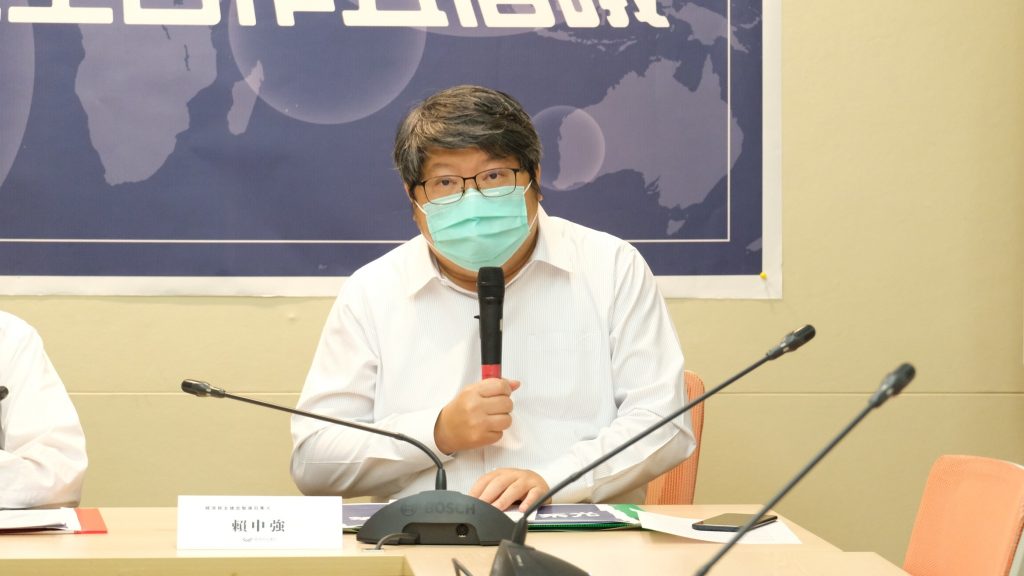
Chung-Chiang Lai, convenor of the Economic Democracy Union Thinktank, indicated that despite being composed of deputy ministers, the MOEAIC was only staffed by 55 people; not only does it suffer from insufficient capacity, its personnels are mostly investment promotion officials of the Ministry of Economic Affairs. Ming-Pin Chang, the Executive Secretary, is the current acting director of the Department of Investment Services, CEO of “Invest Taiwan”, and the executive director of the Investment Promotion Service Center of the Ministry of Economic Affairs. This indicates that the current institutional setup absurdly confuses the conflicting characters of “investment review and screening” with “investment promotion”. Cases where former MOEAIC officials joined commercial interest groups or CCP united front organizations* also exist:
| Former MOEAIC Official | Occupation at Commercial Interest Groups | Position in CCP United Front Organizations |
| Former Executive Secretary: Lien-Sheng Tsai | Secretariat General of Chinese National Federation of Industries | Deputy Secretariat General of Cross-Strait CEO Summit |
| Former Executive Secretary: Liang-Tung Fan | Secretariat General of Chinese National Association of Industry and Commerce | Deputy Secretariat General of Cross-Strait CEO Summit |
To promote economic security cooperation between Taiwan and the United States, the investment review committee responsible for the review of domestic and foreign investment and technical cooperation must undergo organizational transformation, and introduce national security, prosecution, technology and anti-money laundering talents. The two deputy executive secretaries shall be staffed by National Security Bureau officers, and Ministry of Justice Investigation Bureau officers; a resident prosecutor shall also be included in the reorganizations, to investigate immediately should any illicit activity arise.
*Note: The first “Cross-Strait Entrepreneurs Purple Mountain Summit” was held in Nanjing in 2008, with its organizers being “Nanjing Municipal Government and the Taiwan Affairs Office of Jiangsu Province”, and its directors being “the Taiwan Affairs Office of the State Council and the Association for Relations Across the Taiwan Straits (ARATS)”. In 2012, when the fourth annual summit was being convened in Nanjing, participants suggested the upscaling and transforming of the summit, thus establishing the Cross-Strait CEO Summit as the platform for cross-strait entrepreneurial cooperation and dialogue. It would be no exaggeration to call the “Cross-Strait CEOs Summit” a United Front Organization of the CCP.
Information regarding the press conference
Organizer: Economic Democracy Union
Time: Sep. 29th, 2022 (Thu.) 09:10
Location: Zhonghsing Building 103, Legislative Yuan
Speakers:
Hsu-Shao Ou, Researcher, Economic Democracy Union
Guan-Ze Syu, Researcher, Economic Democracy Union
Chung-Chiang Lai, Convenor, Economic Democracy Union Thinktank Contact: Hsu-Shao Ou


